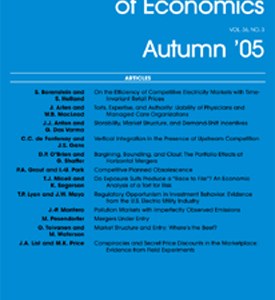
Biais, B. and Perotti, E. (2008). Entrepreneurs and new ideas RAND Journal of Economics, 39(4):1105--1125.
-
Affiliated author
-
Publication year2008
-
JournalRAND Journal of Economics
We study how early-stage new ideas are turned into successful businesses. Even promising ideas can be unprofitable if they fail on one dimension, such as technical feasibility, correspondence to market demand, legality, or patentability. To screen good ideas, the entrepreneur needs to hire experts who evaluate the idea along their dimensions of expertise. Sharing the idea, however, creates the risk that the expert would steal it. Yet, the idea-thief cannot contact any other expert, lest he should in turn steal the idea. Thus, stealing leads to incomplete screening and is unattractive if the information of the other expert is critical and highly complementary. In such cases, the entrepreneur can form a partnership with the experts, thus granting them the advantage of accessing each other's information. Yet, very valuable ideas cannot be shared because it is too tempting to steal them.